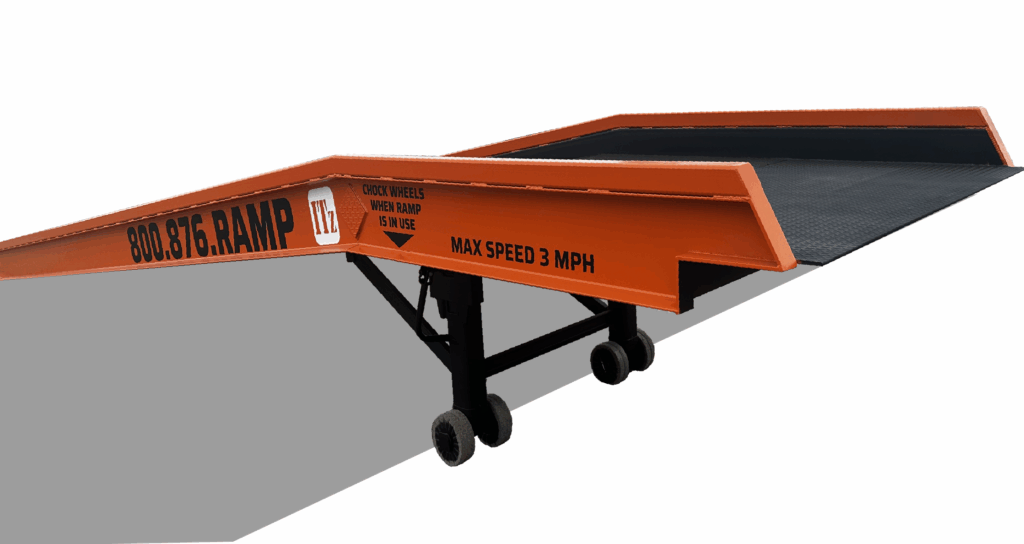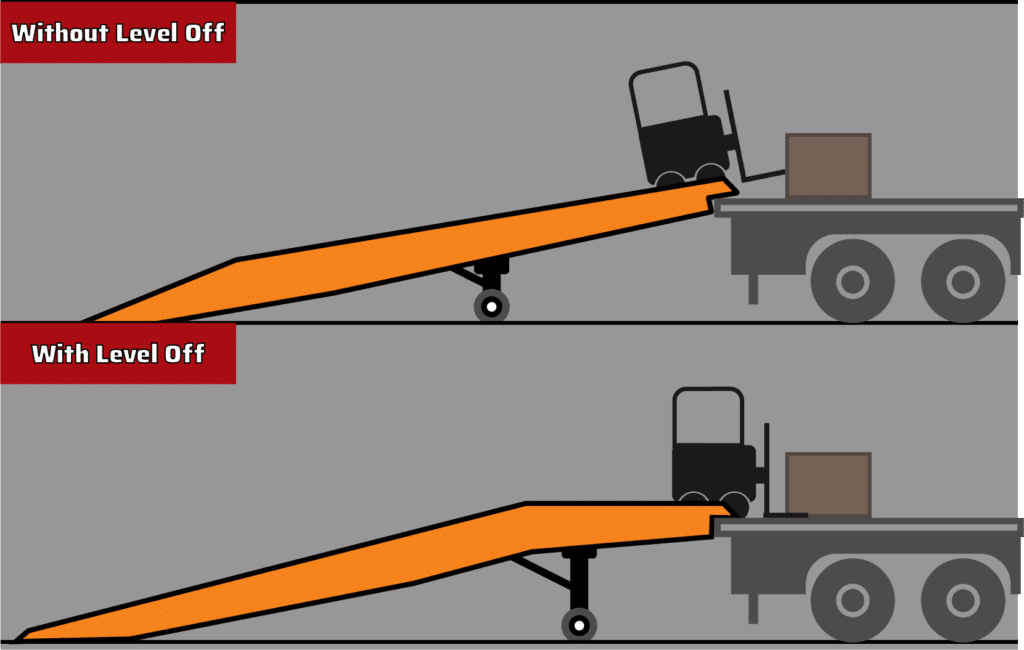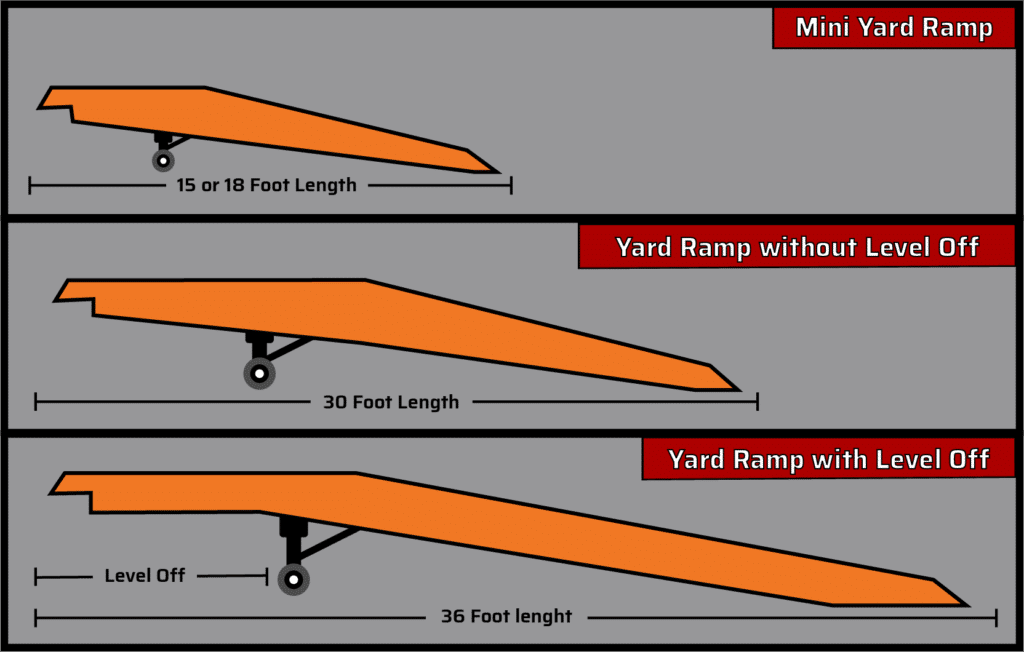The 2025 Ultimate Yard Ramp Buying Guide

If you’re in the market for a yard ramp, forklift ramp, or portable loading dock, you’ve landed on the most comprehensive resource available. At HandiRamp, we specialize in providing the highest quality yard ramps for a wide variety of industries and applications. Whether you’re exploring a yard ramp rental or ready to invest in a yard ramp for long-term use, this June 2025 guide walks you through everything you need to know, from choosing the right ramp size to ensuring top-notch safety and efficiency.
What are Yard Ramps?
When searching for loading and unloading solutions, you might come across terms like yard ramps, forklift ramps, and portable loading docks. While they may sound like different products, they’re essentially the same type of equipment: a heavy-duty, mobile ramp designed to bridge the gap between ground level and elevated surfaces such as trucks, trailers, or loading docks.
These ramps allow forklifts and other equipment to safely and efficiently move goods in and out of shipping containers, trailers, or warehouse docks, especially in environments that lack permanent loading infrastructure.
Common Use Cases:
- Warehouses without built-in docks
- Distribution centers handling variable trailer heights
- Construction and agricultural sites with uneven or remote access points
- Cross-docking and logistics operations needing portable solutions
- Job sites or temporary operations where a traditional dock isn’t available
Yard Ramp Rental vs. Buying: Which Is Right For You?
When deciding between buying or renting a yard ramp, it’s important to weigh the pros and cons of each option based on your specific needs, usage frequency, and budget. Both choices offer distinct advantages, whether it’s the long-term savings and customization or the low upfront cost and convenience of renting. Below, we’ve broken down the key benefits and drawbacks of each to help you make an informed decision, along with HandiRamp’s expert recommendation based on decades of industry experience.
-
Pros
Cons
Buying
- Lower long-term cost
- Customization available
- Asset depreciation benefits
- Can be used as a tax deduction via Section 179
- Higher upfront investment
- Requires storage when not in use
Renting
- Low initial cost
- Ideal for short-term or seasonal use
- No maintenance responsibility
- Long-term renting can become costly
- Limited availability
- Less customization
- Transportation costs to and from the rental location
HandiRamp's Yard Ramp Buy/Rent Recommendation:
Buy
if you're using the ramp regularly (4+ months/year), or require a ramp with custom specs
Rent
For one-time or seasonal needs
If you anticipate using a yard ramp regularly, especially for four months or more each year, purchasing is typically the smarter long-term investment. Owning your ramp means you’ll have it on-site and ready whenever you need it, with the added benefits of asset depreciation for tax purposes and the ability to customize it to suit your exact facility layout and loading needs. You also have the option of buying a used yard ramp, which allows you to own your ramp at a lower cost compared to a new yard ramp.
On the other hand, renting is a practical, cost-effective solution for one-time projects, seasonal surges, or temporary needs like special events, construction projects, or warehouse reconfigurations. Renting eliminates a large upfront investment and maintenance responsibilities, while giving you access to quality, well-maintained ramps on demand. The downside to renting is that you’ll be paying transportation costs for the yard ramp on more than one occasion.
Sizing & Selection: How to Choose the Right Yard Ramp
Choosing the right yard ramp for your operation is essential for ensuring both efficiency and safety when loading or unloading cargo and payloads. The wrong size or capacity can slow down productivity and put operators at risk. Let’s break down the essential criteria for selecting the right yard ramp for your business:
1. Ramp Length______________________________________
The length of your yard ramp plays a critical role in how steep the incline will be, which directly affects the safety and efficiency of your loading and unloading process. A longer ramp provides a gentler slope, making it easier for forklifts and other equipment to travel up and down safely, especially when carrying heavy or bulky loads.
Most yard ramps are available in standard lengths of 30 or 36 feet, though custom sizes can be manufactured based on site-specific requirements.
Yard Ramps with Level Offs
One key design feature that can vary between yard ramps is the level off section at the top. A yard ramp with a level off includes a flat, horizontal section, typically from 6 to 8 feet long, at the top of the incline. This allows forklifts and other equipment to safely level out before entering a trailer or dock, making it easier to maneuver and reducing the risk of sudden shifts or tipping when transitioning from the ramp to the loading area. A level off is crucial for forklifts that are unloading pallets from a trailer.
On the other hand, a yard ramp without a level off continues its incline right up to the edge of the trailer or dock. Yard ramps without level offs are most often used with an existing 48” high dock to convert it into a drive-in door. They can also be combined with a portable loading platform to create a section for forklifts to level out at.

As a general rule of thumb, you should always choose a yard ramp with a level off to ensure your pallets and cargo can be moved safely by your forklift. The size of your level off will depend on the size of the forklifts and other equipment you’ll be using on your ramp. If you’re looking to convert your existing dock into a drive-in door, a yard ramp without a level off with suffice.
Which Length Yard Ramp Do I Need?
Typically, the standard dock height and standard trailer height are 48 inches. Yard ramps have an operating height from 40 to 60 inches, which will accommodate docks and trailers as well as a variety of other loading situations. As mentioned above, a longer yard ramp will have a more gentle slope, but even extended to 60 inches in height, a 30-foot yard ramp would still have a slope less than 10 degrees, which is within the recommended grade for forklifts.
In short, a longer yard ramp will have a more gentle slope for transporting large, heavy loads and can accommodate a longer level off, while a shorter yard ramp will still accommodate a suitable slope for forklifts while also being a bit more compact.

2. Weight Capacity ___________________________________
When selecting a yard ramp, weight capacity is one of the most critical factors to get right. The ramp must safely support the combined weight of your heaviest forklift, its operator, and the maximum load it will carry. Underestimating this can lead to dangerous consequences, including ramp damage, structural failure, or serious workplace injuries. Yard ramps typically have weight capacities of 16,000, 20,000, 25,000, or 30,000 lbs.
Capacity
Typical
Use
Common Industries
Forklift
Sizes
16,000 lbs
Palletized goods, crated materials, and small equipment. Great for occasional or seasonal use.
Warehousing, retail distribution, light manufacturing, farm/agriculture.
Small/mid-size and standard warehouse forklifts
20,000 lbs
Fit for most applications and the standard capacity of yard ramp rentals.Good for daily shipping/receiving, small machinery, and bulk materials.
Manufacturing, logistics, distribution centers, and rental yards.
Standard warehouse and mid-size forklifts
25,000 lbs
A step above the standard: larger machinery, heavy pallets, bundled steel, or continuous, high-traffic use.
Industrial manufacturing, construction material yards, freight depots.
Heavy forklifts carrying substantial loads
30,000 lbs
Heavy-duty use: oversized equipment, massive coils, heavy generators, or multi-ton crates. High-capacity, continuous use.
Steel mills, ports, military logistics, and mining equipment yards.
Heavy-duty forklifts or other equipment moving large loads
How to Determine Your Required Capacity
The general rule of thumb when determining the capacity of your yard ramp is (Forklift Weight + Maximum Load Weight) x 1.25.
Start by identifying:
- The heaviest forklift you’ll be using (check the manufacturer’s specs for operating weight).
- The maximum load weight the forklift will carry.
- Add these together to get your total anticipated weight.
- Apply a 25% safety factor to ensure your yard ramp can support loads or equipment that may be heavier than what you’ve anticipated. Sometimes you never know what you might need to move until it happens!
3. Ramp Width_______________________________________
Ensure that your yard ramp is wide enough to safely accommodate your largest forklift, skid steer, or other vehicles or equipment.
When researching your yard ramp purchase, you may only see one number listed under “width” in the spec sheet. While most manufacturers will primarily list the usable width, it’s important to know both the total width and usable width of your yard ramp for planning your setup and operations.
While the total width refers to the width from outer corner to outer corner on the yard ramp, including any side curbs or handrails, the usable width, as you’ve probably guessed, is the actual usable width for your forklift or equipment to travel on. While the width of the side curbs or rails can vary by manufacturer, the side curbs on HandiRamp yard ramps are 4 inches in width each, accounting for 8 inches of the total width.
Usable Width
70″
84″
96″
Total Width
78″
92″
104″
4. Material___________________________________________
Continuing your yard ramp selection journey, you’ll see that many yard ramps are constructed of steel, but there are also aluminum options available as well. Steel yard ramps are known for their superior strength and durability, making them the go-to choice for heavy-duty, high-capacity jobs such as loading and unloading forklifts, shipping containers, or large freight. They’re built to withstand constant use in rugged industrial environments and can handle significantly higher weight capacities than their aluminum counterparts.
Steel Yard Ramps:
- Have the highest weight capacity.
- Heavier, highly durable, and ideal for rugged industrial applications.
- Typically equipped with serrated grating for superior traction in all weather conditions.
- Requires a forklift to move.
Aluminum yard ramps, on the other hand, offer the advantage of being much lighter and easier to move, making them ideal for more light-duty situations. While they’re not designed for the same heavy loads as steel ramps, aluminum models are still tough, corrosion-resistant, and a great option for lighter material handling tasks.
Aluminum Yard Ramps:
- Lightweight and corrosion-resistant, making them suitable for indoor and outdoor environments.
- Lower weight capacity.
- Can be moved manually or with light machinery.
- Ideal for lighter-duty operations.
5. Ramp Lift Operation________________________________
Another option you’ll find when selecting a yard ramp is the choice between hydraulic or manual crank lift systems. While hydraulic systems offer speed and automation, manual crank systems present compelling advantages in terms of reliability, maintenance, and cost-effectiveness.
Manual crank systems operate through a stepped-down geared mechanism that converts rotational crank motion into vertical ramp movement. This allows for precise control over the ramp’s height without the need for external power sources. This simplicity translates to fewer components that could fail, significantly reducing the likelihood of operational downtime. Moreover, manual systems are less susceptible to environmental factors such as temperature fluctuations, which can affect hydraulic fluid viscosity and system performance.
In contrast, hydraulic lift systems rely on pumps, fluid reservoirs, hoses, and cylinders to adjust the ramp’s height. While eliminating the physicality of a manual system, hydraulic systems require regular maintenance to prevent leaks, fluid degradation, and mechanical failures. The complexity of hydraulic systems usually leads to increased maintenance costs and more downtime.
In summary, while hydraulic systems may offer quicker adjustments, manual crank systems provide a more reliable, low-maintenance, and cost-effective solution for yard ramp operations, making them a preferred choice for many yard ramps.
Safety & OSHA Compliance: Our Commitment
Even though it’s a massive piece of critical equipment, there’s a dirty little secret in the yard ramp industry: no industry-wide standards exist for verifying the overall safety and capacity ratings claimed by manufacturers. Unlike sectors such as automotive, where strict guidelines govern safety, performance, and design, the yard ramp market operates with minimal regulation. As a result, the quality and reliability of ramps can vary significantly. That’s why it’s crucial to understand what sets a well-built, dependable yard ramp apart from the rest.
Since there are no formal regulations governing yard ramp construction, HandiRamp follows its own rigorous, in-house standards to guarantee that every ramp we produce is exceptionally safe and exceeds any applicable OSHA standards. This commitment ensures our yard ramps consistently rank among the most trusted and durable options available.
Safety Features at a Glance:
When it comes to material handling equipment, safety is non-negotiable, and HandiRamp takes that responsibility seriously. Every yard ramp is built with a range of safety features designed to protect both operators and equipment during loading and unloading operations. From structural load testing to enhanced visibility, these built-in safeguards help reduce risks and improve efficiency in demanding work environments.
Here’s a quick look at the key safety features that set HandiRamp’s yard ramps apart:
- FEA (Finite Element Analysis) load capacity simulation tested to ensure accurate weight capacities
- Serrated steel grating for all-weather traction
- Steel side curbs for rollover protection
- Safety chains to secure the ramp to trailers or docks
- High-visibility paint
Frequenly Asked Questions
Do I need a permit for a portable yard ramp?
No! Unlike permanent concrete loading ramps, portable yard ramps are not a permanent structural addition and will not need a building permit.
What yard ramp do I need for my application?
Still unsure about which yard ramp specifications will best fit your operations? Just give our ramp experts a call at 800-876-7267, and we’ll give you a personalized recommendation!
What is the lead time for a yard ramp rental?
We maintain the largest nationwide inventories of yard ramp rentals. Check out our yard ramp rental locator to see which yard ramps are available or soon to be available near you. Depending on your location, your rental could get to you in only a couple of days. Talk to your sales rep for more info.
Can yard ramps be customized?
Absolutely. HandiRamp has been manufacturing ramps since 1958, and we specialize in custom solutions. We offer customizable options for ramp length, width, capacity, level-off sections, surface materials, and everything in between to meet your specific site or operational needs. Just give us a call at 800-876-7267!
How long does a yard ramp typically last?
With proper care and maintenance, a quality yard ramp can last 10–20 years or more, depending on frequency of use, environmental conditions, and load demands.
Can I use a yard ramp on gravel or uneven ground?
Yes, but your yard ramp will fare better with rubber pneumatic wheels on gravel and uneven ground. Just ask your sales rep about changing the wheels!
What maintenance is required for a yard ramp?
Yard ramps need routine inspections for structural wear, debris removal from grating surfaces, lubrication of moving parts (for manual cranks or hydraulic systems), and regular checks on safety chains and tires if applicable.
Are yard ramps difficult to Install?
No at all! Portable yard ramps are delivered fully assembled and ready for immediate use. Position it with a forklift, secure it with safety chains, adjust the height, and you’re ready to work.
How do I get my yard ramp off/on a flatbed?
We have in-depth instructions for getting your yard ramp on and off a truck using your forklift. If you have any questions, please don’t hesitate to call us at 800-876-7267!
Conclusion: Invest in the right yard ramp with confidence
When it comes to improving the efficiency, safety, and flexibility of your loading and unloading operations, choosing the right yard ramp is one of the best investments you can make. From selecting the correct length, width, and weight capacity to deciding between steel and aluminum construction or manual versus hydraulic lift systems, every detail plays a role in ensuring your equipment works seamlessly with your operation.
At HandiRamp, we’ve spent decades designing, manufacturing, and delivering industry-leading yard ramps tailored to the unique needs of warehouses, logistics companies, construction sites, and industrial operations of all sizes. Whether you’re in the market to rent for a short-term project, purchase a new ramp, or explore custom options, our experienced team is ready to help guide you through the process and recommend the best-fit solution for your business.
Call us today at 800-876-7267 for a free, no-obligation quote. No matter your application, HandiRamp has the experience, inventory, and commitment to get your operation moving safely and efficiently.

